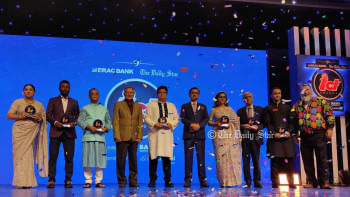Katimon mango cultivation growing in Rajshahi

Rafiqul Islam, a resident of Rajshahi's Durgapur upazila, is breaking the mould when it comes to mango farming as he cultivates a non-traditional variety of the fruit called Katimon that grows year-round.
And although most mango orchards make good tourist spots during the summer months, Islam's orchard on the bank of his leased pond is unlikely to attract anyone as the trees are no more than six feet tall.
However, this is no cause for concern as despite being smaller in stature, these mango trees earn him far more money compared to traditional ones.
"One has little chance of incurring losses cultivating Katimon mangoes," said Islam, an agricultural entrepreneur.
He only harvests the fruit at the end of August, when the traditional mango season usually comes to an end. As a result, he faces no competition.
By taking advantage of the off-season sales, Katimon mangoes bring him three times higher profit compared to traditional varieties.
"I harvest the fruit only when it is not the mango season as they rule the market amid a lack of competitors," added Islam, who farms alongside his job as a journalist.
Most traditional varieties do not sell for more than Tk 2,000 per maund (about 37 kilogrammes), but the starting price for Katimon mangoes is Tk 7,000 per maund.
Traders in the Baneswar retail market say Katimon mangoes are selling for as much as Tk 11,000 per maund.
Local entrepreneurs brought the Katimon variety to Bangladesh from Thailand about six years ago and it quickly acclimatised to the local climate.
Since then, entrepreneurs in Rajshahi and its neighbouring districts have been increasingly turning to Katimon cultivation with about 250 farmers now growing the fruit.
The Department of Agricultural Extension (DAE) recorded that Katimon mangoes were cultivated on 700 hectares of land across the country in 2021-22.
Of the total acreage, 523 hectares come from four districts in the Rajshahi region: Rajshahi, Naogaon, Chapainawabganj and Natore.
The fruit is also being cultivated in the Dinajpur, Rangpur and Thakurgaon districts.
DAE officials in Rajshahi expect Katimon cultivation to rise by 200 hectares in the current fiscal year.
"The cultivation of Katimon is becoming popular as it guarantees profit," said Soror Uddin, a noted mango researcher.
Many growers have also raised nurseries alongside their orchards for selling Katimon saplings amid the increasing demand, he said.

Another benefit of Katimon mangoes is that it can be stored for longer than other varieties.
However, the Katimon variety still does not account for 1 per cent of the country's annual mango production of 12.22 lakh tonnes.
The total area of land being used to cultivate mango currently stands at about 95,243 hectares with the average production rate of Katimon mangoes being 7.37 tonnes per hectare.
Mozdar Hossain, deputy director of the Rajshahi DAE, argues against Katimon cultivation.
"The additional management costs for year-round production can make this variety commercially unviable," he said, suggesting farmers grow BARI-11 mangoes instead.
During a recent visit to Maria village in Durgapur upazila, this correspondent visited an orchard that Islam had raised on the banks of one of his ponds, which he previously used for aquaculture for about a decade.
After fish farming, Islam tried his hand at cultivating bananas. But after hearing about Katimon mangoes, he did not hesitate to invest in the fruit.
The Katimon trees were planted in rows of three alongside two rows of banana trees, and unlike traditional mango orchards, the trees were rarely higher than six feet.
And despite being barely a year old, some of them were already adorned with mangoes while others were either in the flowering or budding stage.
"I raised this orchard three years ago by bringing saplings from Dinajpur," Islam said.
The agricultural entrepreneur developed mango orchards on the banks of at least 14 ponds on 200 bighas of leased land.
Last year, he harvested mangoes worth Tk 3 lakh. He expects a higher yield this year.
"I have not been able to make a profit yet as I have set a long-term plan for quality mangoes by growing better trees. But anyone can earn a profit from the first year," he said.
"You can't miss making profits after the successful cultivation of Katimon mangoes."


 For all latest news, follow The Daily Star's Google News channel.
For all latest news, follow The Daily Star's Google News channel. 



Comments